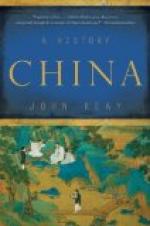Over against this dying class of the gentry stood, broadly speaking, a tripartite opposition. To begin with, there was the new middle class, divided and without clear political ideas; anti-dynastic of course, but undecided especially as to the attitude it should adopt towards the peasants who, to this day, form over 80 per cent of the Chinese population. The middle class consisted mainly of traders and bankers, whose aim was the introduction of Western capitalism in association with foreign powers. There were also young students who were often the sons of old gentry families and had been sent abroad for study with grants given them by their friends and relatives in the government; or sons of businessmen sent away by their fathers. These students not always accepted the ideas of their fathers; they were influenced by the ideologies of the West, Marxist or non-Marxist, and often created clubs or groups in the University cities of Europe or the United States. Such groups of people who had studied together or passed the exams together, had already begun to play a role in politics in the nineteenth century. Now, the influence of such organizations of usually informal character increased. Against the returned students who often had difficulties in adjustment, stood the students at Chinese Universities, especially the National University in Peking (Peita). They represented people of the same origin, but of the lower strata of the gentry or of business; they were more nationalistic and politically active and often less influenced by Western ideologies.
In the second place, there was a relatively very small genuine proletariat, the product of the first activities of big capitalists in China, found mainly in Shanghai. Thirdly and finally, there was a gigantic peasantry, uninterested in politics and uneducated, but ready to give unthinking allegiance to anyone who promised to make an end of the intolerable conditions in the matter of rents and taxes, conditions that were growing steadily worse with the decay of the gentry. These peasants were thinking of popular risings on the pattern of all the risings in the history of China—attacks on the towns and the killing of the hated landowners, officials, and moneylenders, that is to say of the gentry.




